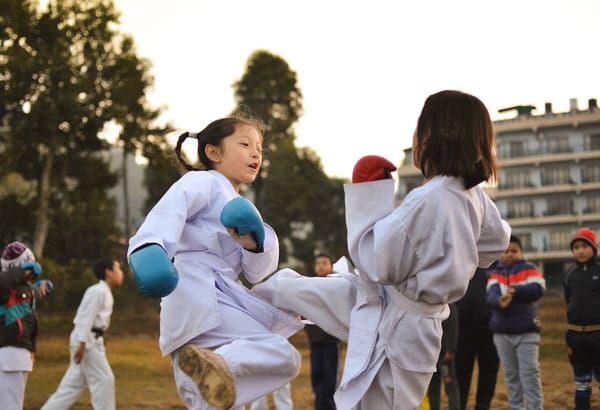I’ve talked to a few people since publishing my piece on How to Read Self Help, and I realise there are a number of non-obvious implications that I didn’t lay out in my original piece. Some of them are actually pretty surprising — and most of them are useful. So let’s explore the most interesting ones here.
To recap, in my post I argued that you should think of self help as a form of ‘technê’ — the word that the Ancient Greeks used to describe tacit knowledge. Tacit knowledge is the sort of knowledge that is difficult to teach and must be mastered by practice — that is, things like music, martial arts, and business. I then argued that to simplify matters, replace ‘self-help’ in your head with ‘martial art’.
(If you don’t have any experiences with martial art, then replace ‘self-help’ with any sport or hobby that embodies tacit knowledge — football, for instance. Or cooking. Or board games.)
Don’t Argue About Self Help
Arguing about a punch or a throw is largely a waste of time. Arguing over the best way to bake a cake is equally stupid. It’s better to try things out in practice. Hear both sides, then work the technique in the dojo, try it out in competition, bake a cake over the weekend with too much butter and see what happens.
Embrace failure!
Let the joy emerge from the winning when you master the technique, instead of emerging from winning the argument about the technique.
“But wait!” I hear you say, “Isn’t it a good idea to spend some time discussing things over?”
No, not really. Or more accurately: much less than you think.
We have a bias to sit and talk, instead of to shut up and do. The latter is not less thoughtful than the former, but we’ve been trained to think it is. If it’s cheap to test an idea or technique, then it’s more costly to spend time arguing than it is to test the thing. Thoughtfulness can come while doing.
Don’t Yuck Someone Else’s Yum
In my original essay, I wrote that you may apply a ‘power test’ to self-help techniques. A power test is built on the observation that difficult problems require adequately powerful techniques to overcome. You may reject a self-help author if all they’re recommending are insufficiently powerful techniques.
As a concrete example, I described how mindset tweaks work when you’re held back by a negative mindset more than anything else; however, if you intend to fix a bad situation in your life and lack the actual power to do so, the first step is not to do a mindset change, but instead to find ways to earn that power instead.
Mindset tweaks — the mainstay of authors like Tony Robbins — aren’t powerful enough to deal with some situations I face. But that doesn’t mean they aren’t useful.
It could well be that there are people who would benefit from learning Robbins’s techniques, and that after being helped by his techniques, grow strong enough to move on to other ones. A ‘power test’ implies a ladder of techniques, ordered in terms of power; authors you find useless might be just what someone else needs.
You’re likely to have experienced this before: a friend recommends a technique or book that “changed their life!” but you read it and nothing happens. Or you recommend a book that changed yours, and it does nothing for your friend.
The truth here is that you can’t know how helpful a self-help technique might be for someone else. Sometimes, the right piece of advice, written the right way, might be perfect for someone — when that someone isn’t you.
Look Beyond the Author’s Privilege
This is actually a subset of ‘optimise for usefulness’.
After my summary of Cal Newport’s Deep Work, I went googling around for other summaries on the web. I found this review, from 2017: I Read Cal Newport’s Deep Work So You Don’t Have To. Natalie Luhrs writes:
Cal Newport’s Deep Work is both a useful and an incredibly infuriating work to read: there are a lot of really good productivity strategies but they’re encased in a layer of academic tech-bro privilege of which he seems to be wholly unaware.
(…)
He then gives three examples and these examples are clearly intended to make his chosen profession look more important the sort of work most white collar professionals find themselves doing. The first example is that it would take 55 to 75 months to train a recent college graduate to edit an academic paper (not write, edit) for publication, while the second and third examples are significantly more common types of work: creating presentations and attending strategy meetings. Newport feels that it would only take two to three months for a recent college graduate to learn to do these tasks competently and thus, it’s shallow work and not truly valuable.This is also when I started wondering if Newport has ever held a non-academic job or if he’s just using what he’s read in Dilbert as his mental model.
These passages leapt out to me because Luhrs focuses on the details of Newport’s life, and bemoans the inapplicability of his techniques to people in circumstances different from his.
This isn’t optimising for usefulness.
Think about how absurd this line of reasoning is if you treated Newport’s self-help like you would a martial arts technique. There are certain techniques in Judo that are better suited for tall people, just as there are techniques suited for shorter ones. If a tall practitioner introduces a technique that works for him due to his height, the answer isn’t to complain about the practitioner’s height — it’s to see if there’s anything there that you may adapt to your repertoire, and then go off to test those observations!
When Sheryl Sandberg’s Lean In came out, I remember a whole horde of responses panning the book, calling it deeply privileged. But that wasn’t the point of Sandberg’s book! In it, she details techniques she’s used to get ahead in a male-dominated world. The act of sharing her mental models, techniques and experiences are valuable; the point is that such technê — like all practitioner techniques — need to be adapted to reader’s unique circumstances. [1]
(And if it doesn’t work for you, then you may discard it, but then don’t yuck someone else’s yum).
To bring this back to Newport: sure, Newport has privilege. He writes about knowledge work, because he is a knowledge worker. But, again, that doesn’t detract from his techniques. If you find a way to adapt his ideas to your reality, you’d have come out ahead; it simply isn’t worth the effort to take umbrage at his ideas if he isn’t writing for you, and especially so if your goal is to improve your life.
Stories Are Better Than Advice
Building on my previous point, most authors don’t have the time to think through every scenario in which their technique might apply. That’s your job. But a non-obvious implication of this is that stories are often better than pure advice.
In my previous example, Newport describes techniques that he applied in pursuit of his tenure. Not all of us benefit (or suffer!) from an MIT education, nor from a career in tenure-track academia. But by describing his techniques in detail, and placing it in the context of his life, Newport gives us enough information to deconstruct the techniques of Deep Work and modify them to suit our situations.
I strongly believe that stories are often better than pure advice, because you can see the context from which that advice comes from. This also applies to real life: my instinct is to ask questions whenever someone offers me advice. Specifically, I want to know the contexts in which the person applied said advice, and I see this as gaining more data about the specific technique, the same way you look for demonstrations of a martial arts technique as it’s used in sparring, not mere demonstrations of it with a willing partner.
Advice doesn’t work across different types of context; again, it’s the advice receiver’s job to see the nuances, since it’s only the receiver who knows the full details of their specific situation.
Self Help Techniques Need Handles To Be Useful
I recently posted a comment on Hacker News that summarised my reading of the academic literature on burnout. The top comment in that story, however, was a comment by user vladgiverts, arguing that burnout arises in a company that sees its employees as ‘cogs in a machine’:
I believe this is an issue of human development that affects most companies eventually. Only companies with really developed leaders who, when faced with serious pressure, are able to see people as the unique and complex beings that they are and not make people feel like they somehow don't matter at a fundamental level.
This framework is true, but it isn’t useful. It isn’t actionable, because ‘treat people as unique and complex beings that matter’ is a nice platitude that doesn’t have action handles.
What are action handles? I call action handles levers that you may manipulate to achieve a desired result. For instance, the academic literature gives us the Jobs Demands-Resources development model of burnout, which predicts burnout based on an imbalance between the demands placed on an individual and the resources the individual has to deal with those demands.
Without going into too much detail, this model immediately offers two potential levers for testing its veracity: first, you may reduce the demands placed on each individual in your team, second, you may seek ways to increase resources available to your teammates. The model offers suggestions for both. You may also develop a gauge of each individual’s capacity by keeping close track of their energy levels throughout the course of weekly one-on-ones, adjusting both levers to see if it works in your practice.
This latter model is vastly superior to the former. It provides a model for how burnout emerges in a team, and it directly implies actionable handles for achieving your desired outcome.
Therefore: discard self-help ideas whenever you find a more useful one — that is, one with more action handles. The self-help techniques with more action handles are better because they prescribe action, which in turn allows you to test their efficacy directly.
Developing Technique in the Wild is Better Than Reading Self Help
Finally, it is perfectly true that developing techniques that work for you in your practice is far superior to reading self-help.
Self-help is but one form of taking advice. Actually getting advice from a person is superior to reading it … but learning a technique by practice is superior to both.
If you’re able to learn from practice alone, you wouldn’t need self-help for that part of your life. Treat reading such books with their proper value in mind: as guidelines to your practice, but never a replacement for practice itself.
To put this another way: I grew up on the island of Borneo, in a small city called Kuching. The vast majority of books I read are written by Westerners, writing for cultural and economic backgrounds very different from mine. If I took umbrage at every author who didn’t take me into account, I would never benefit from any of the reading I’ve done. ↩︎
Originally published , last updated .
This article is part of the Expertise Acceleration topic cluster. Read more from this topic here→





